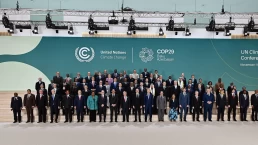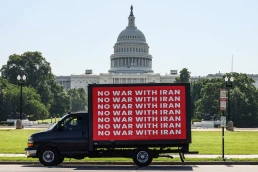Who pays is one of the oldest questions on the climate equity agenda. It’s time to answer it properly.
By Tom Athanasiou, Foreign Policy In Focus
I have for decades been assuring both colleagues and comrades that the climate negotiations are not a sick joke, that “COP” is not short for “Conference of Polluters,” that the negotiations matter. The argument has become easier to make as more people have come to see the implacable necessity of an international way forward. As imperfect as the COP process is, a world without multilateral climate negotiations would be far worse.
Still, there comes a time, amidst the floods and the firestorms, when even the practiced realism of seasoned observers must break down. This time didn’t quite come at COP29, though it came close. As Martin Wolf put it in the Financial Times, “the assessment has to lie between failure and disaster—failure, because progress is still possible, or disaster, because a good agreement will now be too late.”

The climate problem demands an earnest and cooperative international response, but Baku instead saw the Global North present the Global South with a “grim ultimatum”—agree to an inadequate offer of support or risk the collapse of the only international process where it has significant voice and influence. By its end, the Global South had been forced to accede. With the clap of the president’s gavel, and despite a broad push to assert that “no deal is better than a bad deal,” it got a very bad deal indeed.
There was also action on the emissions trading front, where the rules were finally nailed down. But the rules are pretty bad and the deal is more likely to generate a flood of illusory offsets than a flood of quality investment. Also, and importantly, neither carbon trading in particular nor private finance in general can honestly be expected to entirely finance a successful climate transition.
On the public finance side, the pressure to relitigate the Baku deal, already high, can only increase. The last-minute adoption of the “Baku to Belém Roadmap to 1.3 trillion”—a critical commitment to find a real path forward—is likely to define the COP30 agenda. The problem is that, barring an unanticipated political shift of the first order, the Belém COP, too, will fail to rise to the occasion.
The next year is going to be a big one.
Recent Posts
A War With Iran Would Not Be a One-Off Event But a Disastrous Ongoing Rupture
February 26, 2026
Take Action Now If Congress cedes its power to stop a war with Iran, it will fully erode any lingering promise of democratic restraint.By Hanieh…
New Addition to List of Nuclear Near Catastrophes
February 25, 2026
Take Action Now Debris flew for great distances — many times the distance of 270 meters to a nuclear reactor and nuclear storage facility.By David…
Gavin Newsom’s last budget belies his ‘California for All’ pledge
February 24, 2026
Take Action Now Yet, even as the state is poised to lose billions in federal funding, and millions of Californians are losing access to health care…
Israel and American Hawks are Pushing U.S. to Iran War With Catastrophic Consequences
February 23, 2026
Take Action Now At the World Health Assembly in May, member states may endorse an unprecedented strategy declaring that health is not a cost – but…




